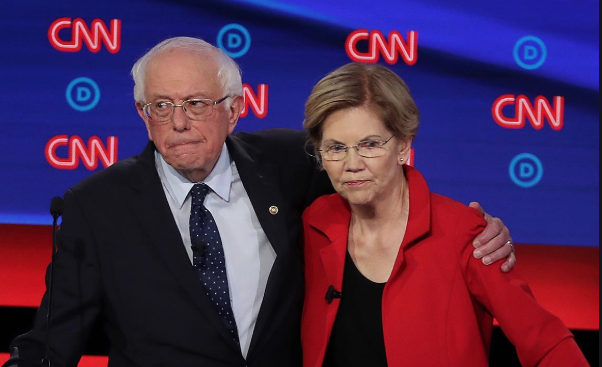Within the liberal-to-left political intelligentsia there’s a debate: Are Senators Bernie Sanders of Vermont and Elizabeth Warren of Massachusetts actually the same? Currently, the two leading progressives are racing each other left for the chance to challenge the more centrist wing of the party, led by candidates such as former Vice President Joe Biden and South Bend, Ind., Mayor Pete Buttigieg.
It’s easy to view the senators as two sides of the same progressive coin: both are liberal populists who aim to challenge the pro-corporate Democratic establishment and upend the current economic system to help working-class Americans. Their support for policies such as Medicare for All, a Green New Deal, a wealth tax, student debt cancellation and more — much of which has rested on teamwork between the two — has shifted the Overton window and expanded widely held notions of what is possible. These ideas have not just existed on the fringes of mainstream debate; thanks to Sanders and Warren’s courage and clarity of vision, they have dominated the discourse. This has often left the rest of the field struggling to defend tired old centrist policies that preserve the status quo, or, in some cases, lurching left in an attempt to keep up.
On the other hand, there’s a clear difference in praxis and political philosophy between the two candidates. Whereas Sanders is a democratic socialist, Warren is a social democrat; he advocates total revolution to transcend the American political order as we know it, while she believes in the power of markets and that the smartest, best-designed policies are the best route to concrete action that can help working people.
For the majority of the Democratic electorate, the choice between the respective Sanders/Warren and Biden/ Buttigieg blocs of the crowded primary field will likely be the easy part. However, how then does a Democrat who wants the party to nominate the most progressive candidate that can be elected proceed?
I am of the mind that political philosophies are important and merit consideration, but political philosophies beget policy — and that is the stuff that shapes our lives. And the two candidates’ philosophies, albeit different, translate into policy in remarkably similar ways.
“Elizabeth and I end up agreeing on a lot of issues,” Sanders said at a CNN town hall in April. It’s true: side by side, their agendas don’t look too different.
For instance, both have long called for government-run, universal healthcare, arguing that the only way to fix the broken insurance market is to eliminate private health insurance altogether. Warren became a co-sponsor of Sanders’ Medicare for All bill in 2017 and has unequivocally endorsed the policy since (despite the fact that it continues to poll poorly with the American electorate). In the first round of Democratic primary debates, when the candidates were asked if they supported eliminating private insurance, Warren bluntly said, “I’m with Bernie on Medicare for All.”
Both also have ambitious progressive tax structures to pay for a bigger social safety net. Warren’s signature tax proposal is to create a tax on wealth — the “Ultra-Millionaire Tax” — which would impose a 2% annual tax on household assets over $50 million and an additional 1% annual tax on household assets over $1 billion. In January, Sanders proposed a major expansion of the estate tax that would include a top rate of 77% (the current rate is 40% ), and would also make the tax kick in at a lower threshold. Warren introduced a similar bill last year.
Further, both candidates have aggressive agendas targeted at Wall Street. Sanders has introduced a proposal that would cap the size of financial institutions, which would break up six of the biggest firms: JPMorgan, Bank of America, Citigroup, Wells Fargo, Goldman Sachs and Morgan Stanley. In her own right, Warren has a corporate governance plan that would give workers a bigger say over corporate bonds and limit executives’ abilities to sell shares of stock that they receive as pay.
Going forward, the right solution for both candidates is to cast a wide net and not just look enviously at the vote share of the other progressive. For months, Sanders hasn’t had much success with this. His national vote share has been stagnant (generally a weird slice of his 2016 base, according to FiveThirtyEight polling data), and his strategy has been basically identical to his (unsuccessful) 2016 method. Warren, on the other hand, has been gaining in the polls and trying to fuse together parts of the Sanders and Clinton coalitions.
As the campaign enters its next phase, it’s important that progressives remain united and remember who their real opponent is. That will demand that Warren and Sanders keep their truce and continue to compete through the boldness of their ideas rather than to clash with each other. And that goes for those Warren and Sanders supporters among us as well.













